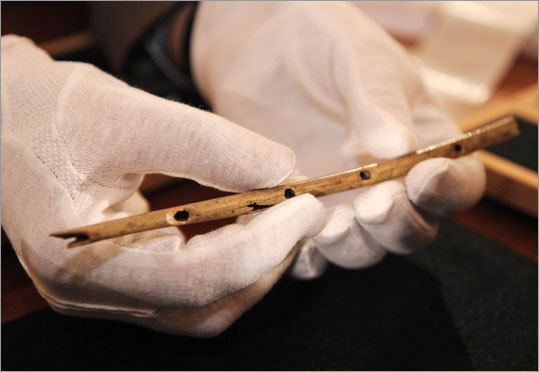http://archive.boston.com/news/health/articles/2009/06/24/archaeologists_unearth_oldest_musical_intstruments_ever_found/
 (AP)Professor Nicholas Conard of the University in Tuebingen shows a flute during a press conference in Tuebingen, southern Germany, on Wednesday.The thin bird-bone flute carved some 35,000 years ago and unearthed in a German cave is the oldest handcrafted musical instrument yet discovered.
Archeologists announced today that they had unearthed the oldest musical instruments ever found -- flutes that inhabitants of southwestern Germany laboriously carved from bone and ivory at least 35,000 years ago.
(AP)Professor Nicholas Conard of the University in Tuebingen shows a flute during a press conference in Tuebingen, southern Germany, on Wednesday.The thin bird-bone flute carved some 35,000 years ago and unearthed in a German cave is the oldest handcrafted musical instrument yet discovered.
Archeologists announced today that they had unearthed the oldest musical instruments ever found -- flutes that inhabitants of southwestern Germany laboriously carved from bone and ivory at least 35,000 years ago.
Archaeologists unearth oldest musical instruments ever found
 (AP)Professor Nicholas Conard of the University in Tuebingen shows a flute during a press conference in Tuebingen, southern Germany, on Wednesday.The thin bird-bone flute carved some 35,000 years ago and unearthed in a German cave is the oldest handcrafted musical instrument yet discovered.
(AP)Professor Nicholas Conard of the University in Tuebingen shows a flute during a press conference in Tuebingen, southern Germany, on Wednesday.The thin bird-bone flute carved some 35,000 years ago and unearthed in a German cave is the oldest handcrafted musical instrument yet discovered.
Click above to listen to a clip of music played on a reconstruction flute. (Copyright Wulf Hein and Tubingen University)
We all knew that Stone Age humans were hunters and gatherers. But sculptors and flutists?
The find suggests just how integral artistic expession may be to human existence: Music apparently flourished even in prehistoric days when mere survival was a full-time endeavor.
The instruments were found in a cave, amid bones from bears and mammoths and flakes of flint from a Stone Age tool shop.
"There were certainly, you know, the Michelangelos back then, who were the highly talented people for carving masterpieces. But the Michelangelos also had to hunt and butcher and chip stones and do all sorts of things," said Nicholas Conard, professor of early prehistory at the University of Tübingen, who led the work described online in the journal Nature today.
The discovery is the latest in a string of archeological finds -- including a sculpted female nude -- that reveal that early modern humans had a sophisticated cultural and artistic life.
"Emotionally, you can look at this thing and recognize yourself; you can see this is a flute, you can imagine yourself playing it, you can imagine yourself making it. It's esentially a connection between us and people who lived 35,000 years ago," said Edward Hagen, an anthropologist at Washington State University Vancouver who was not involved in the research.
"To see this early in the archeological record suggests it might be a fundamental aspect of human nature. ... It does at least hint that music lies close to our foundation of common humanity."
There are numerous theories about why music emerged. Charles Darwin thought that music might give individuals a better chance of attracting mates and reproducing. Others believe it is a way to demonstrate a group's strength and unity. Some think that music may be a byproduct of the evolution of other cognitive abilities, such as language.
The discovery of the flutes does little to settle this debate, since many musical traditions -- such as singing -- wouldn't have been preserved in the archeological record. But it does demonstrate how established music was, especially since the flutes were mixed in with other remnants from daily life, which indicates to scientists that they were used in many contexts.
Just a few feet away from the bone flute, researchers discovered one of the oldest examples of figurative art -- the sculpture of a woman carved from mammoth ivory, which was announced earlier this year. Excavations have also unearthed an array of other art, including carvings of mammoths, cave lions, and mythic half-animal, half-human figures.
The flutes were made by modern humans, who evolved in Africa and spread across the world, arriving in Europe around 45,000 years ago. Radiocarbon analysis by two laboratories indicate that the flutes are at least 35,000 years old, and given their distribution in the excavation, Conard estimates that they date back to about 40,000 years ago.Continued...
No comments:
Post a Comment